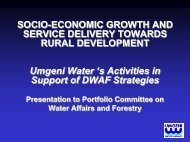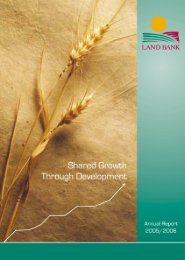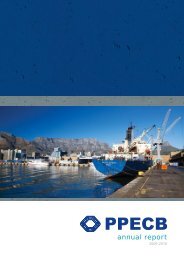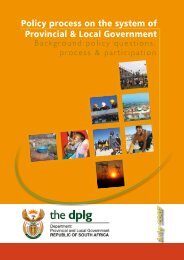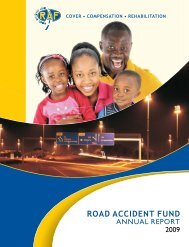Human Settlements Review - Parliamentary Monitoring Group
Human Settlements Review - Parliamentary Monitoring Group
Human Settlements Review - Parliamentary Monitoring Group
Create successful ePaper yourself
Turn your PDF publications into a flip-book with our unique Google optimized e-Paper software.
<strong>Human</strong> <strong>Settlements</strong> <strong>Review</strong>, Volume 1, Number 1, 2010<br />
constitutional obligations should be prioritized<br />
over development that does not.<br />
The National Environmental and<br />
Management Act<br />
The National Environment and Management<br />
Act include a set of principles that specifically<br />
address sustainable development and<br />
environmental management (DEAT1998):<br />
(2) Environmental management must<br />
place people and their needs at the forefront<br />
of its concern, and serve their physical,<br />
psychological, developmental, cultural and<br />
social interests equitably.<br />
(3) Development must be socially,<br />
environmentally and economically sustainable.<br />
(4) (a) Sustainable development requires the<br />
consideration of all relevant factors including<br />
the following:<br />
(i) That the disturbance of<br />
ecosystems and loss of biological<br />
diversity are avoided, or, where they<br />
cannot be altogether avoided, are<br />
minimised and remedied;<br />
(ii) that pollution and degradation<br />
of the environment are avoided, or,<br />
where they cannot be altogether<br />
avoided, are minimised and<br />
remedied;<br />
(iii) that the disturbance of<br />
landscapes and sites that constitute<br />
the nation’s cultural heritage is<br />
avoided, or where it cannot<br />
be altogether avoided, is minimised<br />
and remedied;<br />
(iv) that waste is avoided, or where<br />
it cannot be altogether avoided,<br />
minimised and re-used or recycled<br />
where possible and otherwise<br />
disposed of in a responsible manner;<br />
(v) that the use and exploitation<br />
of non-renewable natural resources<br />
is responsible and equitable, and<br />
takes into account the consequences<br />
of the depletion of the resource;<br />
(vi) that the development, use and<br />
exploitation of renewable resources<br />
and the ecosystems of which they are<br />
part do not exceed the level beyond<br />
which their integrity is jeopardised;<br />
(vii) that a risk-averse and cautious<br />
approach is applied, which takes<br />
into account the limits of current<br />
knowledge about the consequences<br />
of decisions and actions; and<br />
(viii) that negative impacts on the<br />
environment and on people’s<br />
environmental rights be anticipated<br />
and prevented, and where they<br />
cannot be altogether prevented, are<br />
minimised and remedied.<br />
This Act makes it very clear that there is<br />
a requirement for projects to be ‘socially,<br />
environmentally and economically sustainable’.<br />
However it does not provide much further<br />
detail on what this entails. This makes it both<br />
difficult to interpret, and to enforce.<br />
The sustainable development criteria listed<br />
later in this paper are an attempt to describe<br />
this requirement in the form of a set of criteria<br />
that can be used by both government and the<br />
private sector to guide the integration of<br />
39<br />
4<br />
Section 24 of the South African Constitution



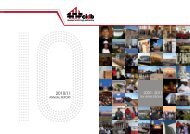
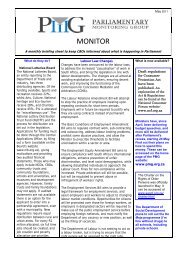
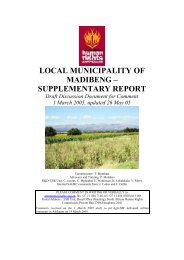
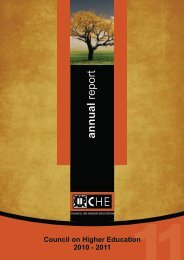
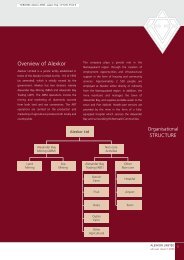
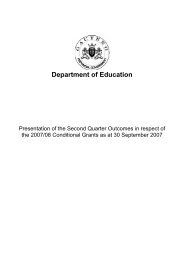
![National Research Foundation Annual Report 2008 / 2009 [Part 2]](https://img.yumpu.com/49774036/1/177x260/national-research-foundation-annual-report-2008-2009-part-2.jpg?quality=85)
